
No clarity about who's in charge in Niger, 2 days after mutinous soldiers ousted the president
Two days after mutinous soldiers ousted Niger’s democratically elected president, it was still unclear Friday morning who was running the country and what mediation efforts were underway, as analysts warned that political chaos could set back the fight on extremist groups and increase Russia's influence in the region. On Thursday, several hundred people gathered in the capital, Niamey, and chanted support for the Russian private military group Wagner while waving Russian flags. Later, they burned cars and ransacked the headquarters of the president's political party. “We’re fed up,” said Omar Issaka, one of the protestors. “We are tired of being targeted by the men in the bush ... Down with the French people. We’re going to collaborate with Russia now,” he said. The soldiers have not announced a leader and President Mohamed Bazoum, who was elected two years ago in Niger’s first peaceful, democratic transfer of power since its independence from France in 1960, has not resigned. Some of the last public communications from the government included a defiant tweet by the president Thursday declaring that democracy would prevail and a call by the Foreign Minister Hassoumi Massoudou, on media outlet France 24, for Nigeriens to stand against the mutiny. Someone close to the president who is not authorized to speak about the situation, told The Associated Press that Bazoum has no intention of resigning and talks were ongoing. However, it's unclear who's involved in these dialogues, the nature of the discussions or how they're proceeding. Analysts say the coup could destabilize the country and threatens to starkly reshape the international community’s engagement with the Sahel region. Bazoum is a key ally in the West’s efforts to battle the jihadists, and the West African nation has been seen as the last major Western partner standing against extremism in a region where anti-French sentiment has paved the way for the Russian private military group Wagner. Neighboring Mali and Burkina Faso have both ousted the French military, which previously provided aid in their fight against jihadists. Mali has contracted Wagner, and it’s believed the mercenaries will soon be in Burkina Faso. Earlier this week, The Economic Community of West African States said it was sending Benin President Patrice Talon to lead mediation efforts, but as of Friday Talon was not in the country. During their first address to the nation Wednesday night, the mutineers urged “external partners” not to interfere. French Foreign Minister Catherine Colonna told French media Friday that President Emmanuel Macron has spoken several times to Bazoum. Colonna said France believes there are still possible exits from the crisis, and that Paris regards the attempted coup as lacking any legitimacy. On Thursday, U.S. Vice President Kamala Harris, said the country's “substantial cooperation with the Government of Niger is contingent on Niger’s continued commitment to democratic standards". Niger could lose millions of dollars in military aid and assistance, which the United States and European countries have recently poured in an attempt to help in the fight against Islamic extremism. The United States in early 2021 said it had provided Niger with more than $500 million in military assistance and training programs since 2012, one of the largest such support programs in sub-Saharan Africa. The European Union earlier this year launched a 27 million-euro ($30 million) military training mission in Niger. The United States has more than 1,000 service personnel in the country. France has 1,500 soldiers, which conduct joint operations with the Nigeriens. The coup has dashed hopes of collaboration between Sahelian countries and Western powers, which offered a more robust response to the jihadist insurrection when compared with the strategies to arm civilians in Burkina Faso or the responsibility given to Wagner in Mali, said Ibrahim Yahaya Ibrahim, senior Sahel analyst for the International Crisis Group. As uncertainty lingers about who's in charge, insecurity could worsen. “The army officers will be busy positioning themselves in power struggles and abandon the fight against jihadists,” said Ulf Laessing, head of the Sahel program at the Konrad Adenauer Foundation. Rights groups also warn that civilians always bear the brunt of these mutinies. “During a coup, the first victims are always the same: the most vulnerable, women and children,” said Drissa Traore, secretary-general of the International Federation for Human Rights. On Thursday the United Nations Office for the Coordination of Humanitarian Affairs said it has paused operations in Niger, where more than 370,000 people are internally displaced and more than 4 million rely on aid. ___ AP writer John Leicester in Paris contributed to this report. Read More Ukraine war’s heaviest fight rages in east - follow live Charity boss speaks out over ‘traumatic’ encounter with royal aide Stock market today: Asian shares mixed, Tokyo falls as Bank of Japan adjusts bond purchase policy India and Japan look to collaborate in building semiconductors and resilient supply chains AP Week in Pictures: Europe and Africa
2023-07-28 15:47
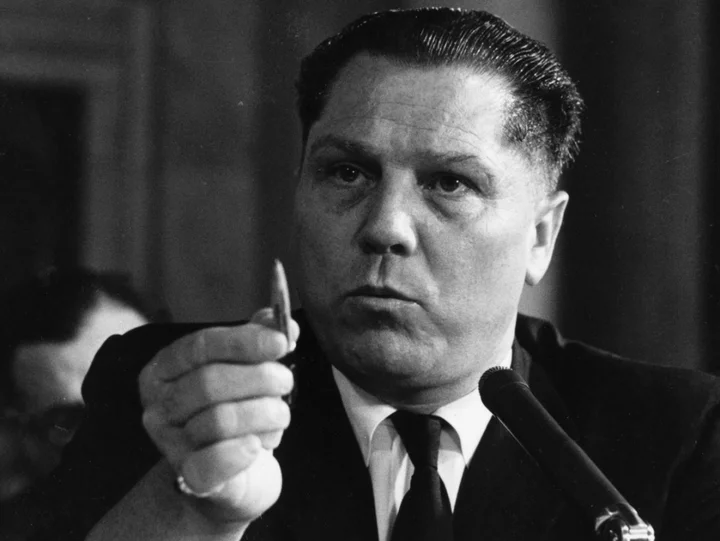
Jimmy Hoffa disappearance anniversary: What happened to long-lost union leader presumed murdered by the mob?
Jimmy Hoffa, the legendary American union organiser, disappeared from a parking lot outside of the Machus Red Fox restaurant in Bloomfield Township, Detroit, 48 years ago on Saturday 30 July 1975. Presumed dead since the same date in 1982, his body has never been found, no one has ever been charged and the case remains unsolved. Hoffa, 62, was last heard from at around 2.15pm that afternoon, calling his wife at their home in Lake Orion and a friend, Louis Linteau, at his office from a public payphone, griping that the two gentlemen he was supposed to be meeting for lunch had failed to show up. He was subsequently spotted talking to several other men nearby before being driven away in a maroon car that one eyewitness, a truck driver, told investigators could have been a Lincoln or maybe a Mercury Marquis. It might as well have been a hearse, for all the difference it made, for James Riddle Hoffa would never be seen again. His own vehicle, a green Pontiac Grand Ville, stood abandoned at the scene, just where he had left it. Long assumed to have been the victim of a mob hit, the visionary general president of the International Brotherhood of Teamsters (IBT) – who dramatically expanded the union’s reach, influence and coffers between 1957 and 1971, before being brought down by scandal – certainly had more than his fair share of powerful enemies and shady associates. Hoffa’s story – or, at least, versions of it – has frequently been told over the past half-century, often fictionalised through characters loosely based upon him in movies like Sergio Leone’s Once Upon a Time in America (1984) or more directly in Danny DeVito’s biopic Hoffa (1992) starring Jack Nicholson, James Ellroy’s Underworld USA novel sequence or Martin Scorcese’s recent The Irishman (2019) in which Al Pacino played the doomed labour leader. But none of those projects have come close to cracking one of the most enduring true crime mysteries in the history of American public life. What really happened to Jimmy Hoffa? Now that is a riddle. Born on Valentine’s Day 1913 in Brazil, Indiana, Hoffa’s Pennsylvania Dutch father John was a coal miner who passed away from lung disease in 1920 when his son was just seven years old, prompting the family to relocate to Detroit, Michigan, soon to become the epicentre of the mighty American auto industry. Realising he would need to grow up fast to support his mother, Hoffa left school at 14 to work as a stock boy for a grocery chain, where he soon took exception to the inadequate wages he received, the perilous terms of his employment and the inequality he saw all around him, which would only worsen in the aftermath of the Wall Street Crash of 1929 with the coming of the Great Depression. Having learned to stand up for himself against workplace injustice, Hoffa quit in 1932 to work as a professional organiser with the Local 299 chapter of the Teamsters union, representing Detroit’s truck drivers and warehouse operatives. As the organisation grew over the course of a combative decade, consolidating its power first locally, then regionally and finally nationally, Hoffa met the Polish girl who would become his wife, Josephine Poszywak, during a strike undertaken by non-unionised laundry workers in early 1937. They married that September. Hoffa’s growing reputation and networking smarts saw him named chairman of the Central States Drivers Council in 1940, president of the Michigan Conference of Teamsters in 1942 and then president of Local 299 by 1946, all without moving so much as a single truck himself. As a labour stalwart, Hoffa secured a draft deferment when the United States entered the Second World War by successfully arguing he would be of far greater service to his country organising industry at home than he might be deployed as a grunt abroad. That also meant he was well positioned to reap the spoils of the American economic boom of the Truman years. By 1952, he was appointed international vice president of the IBT, serving as deputy to Dave Beck, who was himself succeeding Daniel Tobin, who had led the union since way back in 1907. The IBT relocated its headquarters from Indianapolis to Washington, DC, three years later in order to be better placed to lobby Congress for its interests. It had never been more powerful. Then, in 1957, Beck was indicted, convicted and jailed on fraud charges after being hauled before John McClellan’s Senate Select Committee on Improper Activities in the Labour or Management Field. Hoffa was voted in as his successor as general president at the IBT’s convention in Miami Beach, Florida, that October. However, Hoffa’s profile within the labour movement had inevitably increased his exposure to organised crime and he had been arrested earlier that year for allegedly attempting to bribe a McClellan Committee aide, prompting the AFL-CIO to expel the Teamsters from its ranks in passionate opposition to his appointment. The air of notoriety surrounding Hoffa caught the attention of mob-busting US attorney general Robert F Kennedy during his brother’s presidency in the early 1960s and would see much of the organiser’s energies eaten up by legal scraps for much of that decade. He was indicted for jury tampering in Tennessee in May 1963 after again being accused of attempted bribery and was convicted the following March, sentenced to eight years in prison and a $10,000 fine. Four months later, while out on bail for the first offence, he was convicted at a second trial in Chicago, Illinois, on one count of conspiracy and three of mail and wire fraud for improper use of the Teamsters’ pension fund. This time he was sentenced to five years behind bars. After spending three years unsuccessfully appealing those convictions – while simultaneously expanding the union and bringing almost all on-road North American truck drivers together under one National Master Freight Agreement – Hoffa was sent to Lewisburg Federal Penitentiary in Pennsylvania on 7 March 1967 to serve a 13-year aggregate sentence. Despite the disgrace, he refused to resign and went on operating as IBT boss from Lewisburg, remaining in the role until 19 June 1971, when he was replaced by Frank Fitzsimmons, with whom he had a long association dating back to their Detroit days. Hoffa was released from prison on 23 December that year, having served fewer than five of his 13 years after Richard Nixon commuted his sentence on the condition that he refrain from engaging in union activity until 6 March 1980, a stipulation he was bitterly opposed to and battled in court in the hope of being able to wrestle back the Teamster’s presidency, unmoved to consider retirement by the generous pension settlement the organisation had handed him. The Mafia were among those opposed to his comeback ambitions, and one of their enforcers was Anthony “Tony Pro” Provenzano, a capo in New York City’s Genovese crime family with whom Hoffa had once been close but seemingly fallen out with while both men were incarcerated at Lewisburg. Provenzano is one of the men Hoffa is supposed to have been dining with at the Machus Red Fox on the day he vanished. The other was Anthony “Tony Jack” Giacalone, a local heavy who may have been dispatched as a mediator to oversee Hoffa’s appeal for support to Provenzano. Neither would admit to having seen the labour veteran in Bloomfield Township that day and both seemingly had credible alibis. What is known is that the car in which Hoffa is most likely to have been spirited away – a 1975 Mercury Marquis Brougham, after all – belonged to Giacalone’s son Joseph, who had lent it to one Charles “Chuckie” O’Brien, a Hoffa family friend. O’Brien may have been engaged to collect the old man in order to encourage a false sense of security. His fingerprints would later be found on a 7-Up bottle in Hoffa’s Pontiac, although he continued to deny any involvement until his death in 2020. When investigators examined the Mercury on 21 August, police dogs positively identified Hoffa’s scent in its upholstery, strongly suggesting he had ridden in it at least once. Later, in 2001, the advance of DNA technology enabled officers to locate a strand of his hair in the same car, although, again, that was not sufficient to trace it to a specific date. After years of federal investigation had resulted in 16,000 pages of documents spread over 70 volumes but no outcome, leaving Hoffa’s wife Josephine to pass away in 1980 without answers, the FBI’s opinion on what had happened would be outlined by Arthur Sloane in his book Hoffa (1991). In it, Sloane suggested the official verdict was that Northeastern Pennsylvania mob boss Russell Bufalino had ordered the hit and dispatched Thomas Andretta and the brothers Salvatore “Sally Bugs” and Gabriel Briguglio, alongside O’Brien, to carry it out. The quartet then either killed Hoffa inside the vehicle or drove him on to an unspecified location and executed him there, perhaps cremating his body to prevent its rediscovery. That broad outline was effectively confirmed on 16 June 2006 when The Detroit Free Press published the entire 56-page “Hoffex Memo”, an FBI dossier dating from January 1976 in which the bureau expressed its suspicions in writing, arguing the gangsters were concerned that a reinstated Hoffa might interfere with their control of the Teamster’s pension fund or even be persuaded to testify against them. There are numerous quibbles with that theory, however. Experts often argue that Hoffa was too high-profile a target for the mob to assassinate in such a public manner and that his hopes of returning to the leadership of the union amounted to little more than a pipedream by 1975, his name too tarnished to represent a serious threat. According to Sloane, former US prosecuting attorney Keith Corbett also believed that O’Brien was too unreliable to have played a part and that Vito “Billy” Giacalone, the younger brother of Tony Jack, was more likely to have been the fourth man. A completely fresh theory appeared in 2004 with the publication of Charles Brandt’s book I Heard You Paint Houses, the basis for Scorsese’s The Irishman, in which the author argues that hitman Frank Sheeran did the deed in an empty house in Detroit after Hoffa had been delivered into his clutches, the subject having confessed as much in old age. Bloodstains found on floorboards at the scene did not match Hoffa’s DNA, however, and it is often thought unlikely, as was the case with O’Brien, that an outsider might be trusted with such a delicate assignment by the notoriously tribal Italian-American syndicate. Another infamous mob killer, Richard “The Iceman” Kuklinski, claimed in his own 2006 memoir that he was responsible, having been paid the princely sum of $40,000 to whack Hoffa. Kuklinski claimed he drove the body to a New Jersey junkyard, sealed it inside a 50-gallon oil drum and set it on fire, later digging up the charred cadaver and placing it in the trunk of a car that was duly sold for scrap metal. That has likewise never been substantiated. As to the final resting place of Hoffa’s remains, multiple sites have been inspected over the decades without yielding a result, from the now-demolished Giants Stadium in East Rutherford (a tip-off hitman Donald “Tony the Greek” Frankos offered in a 1989 Playboy interview) to a landfill beneath the Pulaski Skyway in Jersey City and even the Renaissance Building in downtown Detroit, now the 73-storey home of General Motors. A farmer’s field, a swimming pool and a suburban driveway in Michigan have all been proposed and discarded while the wildest speculations imagine the missing man tossed from a plane by corrupt federal marshals into the Great Lakes (a theory courtesy of Hoffa bodyguard Joseph Franco, who had a book to sell) or ground up and disposed of in one of the quieter swamps of the Florida Everglades, an idea pitched to the Senate by self-described murderer Charles Allen in 1982. Sadly, we may never know the truth about how Jimmy Hoffa, at one time one of the most famous faces in America, came to vanish into thin air, blown away on the breeze like an old parking ticket, never to be seen again. Read More FBI say no sign of Jimmy Hoffa’s body under New Jersey bridge Events in the disappearance of former Teamsters head Jimmy Hoffa From serious to scurrilous, some of the many Jimmy Hoffa theories
2023-07-28 15:27
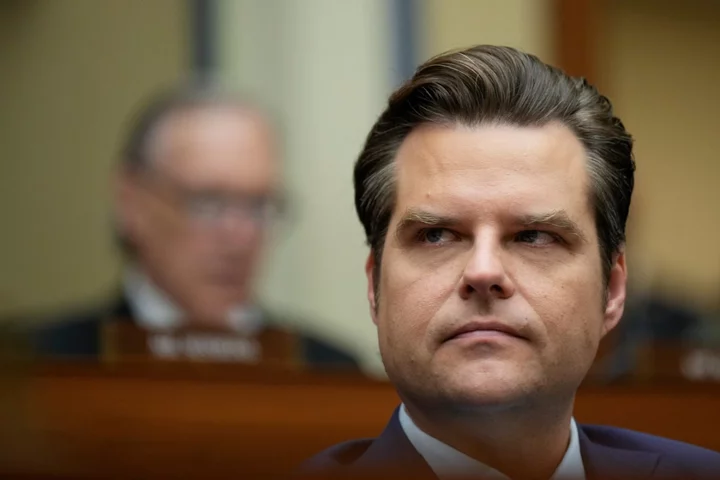
Matt Gaetz called a ‘murderer’ during an ‘all-time low’ anti-trans House committee hearing
As Republican-led states pass legislation to restrict or ban transgender youth from accessing gender-affirming healthcare, Republicans in Congress have held a series of hearings or steered discussion around implementing national bans while raising dubious claims and dismissing guidance from major medical groups. On 27 July, Democratic members of a Republican-led House committee condemned the latest “cynical and dangerous attack” on trans children and their families during one of the first congressional hearings against affirming care and health providers. The panel heard from a former college athlete who advocates against trans women and girls from participating in sports that match their gender, members of right-wing special interest groups that support legislation targeting LGBT+ people, and a person who formerly received affirming healthcare and now advocates against other receiving it. The committee also heard from a Texas mother whose 18-year-old son is transgender, as well as the trangender legal director of a prominent LGBT+ legal advocacy group. While Republican US Rep Matt Gaetz was railing against a law in Washington state that seeks to protect trans children estranged from their parents, a person watching the hearing from inside the chamber called the Florida congressman a “murderer”. “Oh please, get over yourself,” Mr Gaetz responded. Moments earlier, Republican US Rep Wesley Hunt used a poster of a food pyramid to compare children with gender dysphoria to children who want to eat ice cream for every meal. “What if we affirmed every thought our children had?” he said. Democratic US Rep Mary Gay Scanlon called the hearing a “cynical and dangerous attack on trans people and their families” motivated not by medical guidance but poll numbers, with Republican members “just repeating right-wing talking points to delegitimize” healthcare for trans youth, she said. “Today’s hearing is an all-time low for the Republican majority,” said Democratic US Rep Jerry Nadler. “In my three decades in Congress, I have taken part in plenty of hearings where I did not agree with the choice of topic, to say the least. I am absolutely disgusted at the Republican majority’s bullying, bigoted framing of an issue that would otherwise be worthy of serious discussion.” The New York congressman was furious, calling the hearing a “taxpayer-funded platform for congressional Republicans to bully transgender kids, who are already some of the most vulnerable members of our community”. “The last thing trans kids and their parents need in their lives is Republicans in Washington to jump on the anti-trans bandwagon just so they can fear monger for their five minutes of fame,” he added. The hearing – titled “Dangers and Due Process Violations of ‘Gender-Affirming Care’ for Children” – follows proposals from House lawmakers to strip support for affirming care for US military service members in a must-pass national defence bill, as well as a series of hearings and proposals that replicate the avalanche of legislation targeting trans people in nearly every state. By the end of May, state lawmakers had introduced more than 500 bills impacting LGBT+ people in 2023, including 220 bills specifically targeting trans and nonbinary Americans, according to an analysis from the Human Rights Campaign. Republican members of Congress have also introduced federal legislation that mirrors some of the proposals dominating state capitols. One measure would impose national restrictions on trans athletes, and another bill would impose a similar but more-expansive version of what critics have called state-level “Don’t Say Gay” bills used to restrict classroom discussion of LGBT+ people and events. Shannon Minter, legal director of the National Center for Lesbian Rights and the only trans person who addressed lawmakers, said in his opening statement that anti-trans legislation targets less than 1 per cent of the population as well as medication and supportive care regimens that have been widely available for decades. “They are not new. What is new is this recent massive overreach from state lawmakers,” he added. “These laws … they prevent doctors from doing their jobs, they prevent parents from getting medical care they need.” Stripping access to that care will have “devastating consequences for young people’s lives,” he said. “Decisions should be made by parents who love them, not by politicians who know nothing about a child’s life.” Miriam Reynolds, whose son Cameron is trans, shared the family’s journey to understanding what he was experiencing and working with health providers to “It was hard on me at first, but I was able to put my child’s needs before my feelings and find him the care he needed,” she said. “I could see that my child was happier and felt more and more comfortable the more he was affirmed.” There wasn’t any political “hysteria” surrounding his care when he came out several years ago, compared to the currently volatile environment surrounding his existence and the family’s support for him. “It’s absolutely heartbreaking,” she said. “To be looked at as a child abuser, or indoctrinator, or something like that, is extremely painful … It feels very hateful and divisive.” Mr Gaetz grilled Mr Minter about recently enacted Washington state law that allows shelters to first contact the state Department of Children, Youth and Families if trans children entering the facilities. “There’s no reason to treat these situations with transgender young people who may be in danger or at risk of abuse at home, any differently than we would treat any other child,” Mr Minter said. “I want authorities to treat these kids with the same care they treat all other children.” In his remarks, Mr Gaetz ironically defended the rights of “parents to parent” their children while dismissing families who have asked for the same right to support their trans children. “What’s terrible is when you have this incongruent desire of the government to restrain the abilities of parents to parent,” he said. Read More Ron DeSantis threatens legal action over Dylan Mulvaney’s Bud Light video How a Texas ban on gender-affirming care for trans youth could break healthcare for children across the state Trans youth and families condemn ‘heartbreaking’ Tennessee court ruling against gender-affirming care
2023-07-28 08:18

Trump hit with more charges as Mar-a-Lago worker added to documents case
Federal prosecutors have added more charges against former president Donald Trump for allegedly obstructing the investigation into whether he unlawfully retained national defence information at his Palm Beach, Florida property. In a superceding indictment filed late Thursday, prosecutors alleged that Mr Trump and co-defendant Walt Nauta conspired with another Mar-a-Lago worker, Carlos De Oliveira, to attempt to have surveillance footage from the club deleted so it could not be provided to the grand jury investigating the presence of classified documents at his property. Mr Trump was also newly charged with specifically posessing the classified document which he is alleged to have shown to a group of people at his Bedminster, New Jersey club. In a statement, Mr Trump’s presidential campaign called the new charges “nothing more than a continued desperate and flailing attempt by the Biden Crime Family and their Department of Justice to harass President Trump and those around him”. “Deranged Jack Smith knows that they have no case and is casting about for any way to salvage their illegal witch hunt and to get someone other than Donald Trump to run against Crooked Joe Biden,” the campaign said. In the superceding indictment, which was signed by Mr Smith personally, prosecutors allege that Mr Trump masterminded efforts to prevent the government from obtaining the footage it would later use to charge him with obstruction when he was first indicted on 8 June. According to the indictment, Mr Trump allegedly called Mr De Oliveira on 23 June of last year, one day after prosecutors emailed his company a draft grand jury subpoena calling for production of CCTV camera footage from the club, including locations where boxes containing classified documents were stored. It’s not known exactly what Mr Trump said to his new co-defendant during the 24 minute phone call, but prosecutors allege that at some point Mr Trump ordered the deletion of security camera footage so it could not be used to further the probe into his possession of documents with classification markings after the end of his presidency. The next day, prosecutors served the Trump Organisation with the final version of the subpoena, and Mr Trump is alleged to have met with Mr Nauta, who subsequently cancelled plans to travel with Mr Trump and instead arranged travel to Palm Beach. After the former US Navy Chief Petty Officer changed his plans, prosecutors allege that he lied to fellow employees and Secret Service agents about the purpose of his travel. At the same time, he contacted another Mar-a-Lago employee who served as director of information technology at the club, as well as another Mar-a-Lago worker, and disclosed to the latter that his purpose in visiting the club was to discuss how long CCTV footage was stored. Prosecutors also allege that Mr Nauta and Mr De Oliveira actually walked through the darkened club after Mr Nauta arrived there on 25 June, with flashlights to determine where different security cameras were located. Mr De Oliveira, who has also been charged with conspiracy and obstruction of justice, subsequently the aforementioned Mar-a-Lago employee that “the boss” wanted the footage deleted before it could be provided to the grand jury investigating the presence of classified documents at the club. The longtime Mar-a-Lago worker is also charged with lying to FBI agents about his role in assisting in the moving of boxes containing classified documents at different points during the investigation. Additionally, Mr Nauta has now been charged with conspiring with Mr De Oliveira to obstruct justice by participating in the efforts to have the surveillance at issue deleted, and Mr Trump has been hit with another count of obstruction of justice for asking for the footage to be deleted. Prosecutors have alleged that Mr Nauta contacted another Mar-a-Lago worker following the 8 August 2022 search of the club by FBI agents to tell them that “someone just to make sure Carlos is good”. The employee replied that Mr De Oliveira was loyal and would not do anything to harm his relationship with his employer, the ex-president. Mr Nauta also caused the employee to tell an employee of Mr Trump’s political action committee that Mr De Oliveira was loyal, and Mr Trump later personally called Mr De Oliveira to assure him that he would get him legal representation. Mr De Oliveira has been summoned to make his first court appearance in the case on 31 July at the same Miami courthouse where Mr Trump and Mr Nauta were arraigned. The new charges against Mr Trump and Mr Nauta and the charges against their new co-defendant come as Mr Smith and his colleagues are weighing whether to ask a Washington, DC grand jury to indict Mr Trump for crimes allegedly committed as he tried to overturn his 2020 election loss and remain in office against the will of voters. Last week, Mr Trump revealed that prosecutors had given his defence team a letter informing them that he is a target in the Justice Department probe into hiss to effort overturn the election and the January 6 attack on the US Capitol. The letter is understood to lay out three crimes which Mr Trump could be charged for: Conspiracy to defraud the United States, deprivation of rights under colour of law, and tampering with a witness. As grand jurors met at the Washington, DC federal courthouse on Thursday, Mr Trump’s legal team also met with prosecutors to try to dissuade them from seeking what would be the third indictment of Mr Trump since April. The ex-president later took to his bespoke social media platform in the early afternoon to confirm that his defence team had concluded what he described as a “productive meeting” with Department of Justice representatives, He also stated that his legal team spent the session “explaining in detail that [he] did nothing wrong, was advised by many lawyers, and that an Indictment of [him] would only further destroy our Country”. Grand jurors finished their work on Thursday without voting on any indictments, but they could be asked to return charges against Mr Trump when they reconvene on Tuesday. Read More Trump hit with new charges as aide is third person added to classified documents case Black lawmakers press Justice and Education Departments to investigate Florida's race curriculum Biden dispatches top adviser for talks with Saudi crown prince on normalizing relations with Israel Trump hit with new charges as aide is third person added to classified documents case Black lawmakers press Justice and Education Departments to investigate Florida's race curriculum Biden dispatches top adviser for talks with Saudi crown prince on normalizing relations with Israel
2023-07-28 07:22
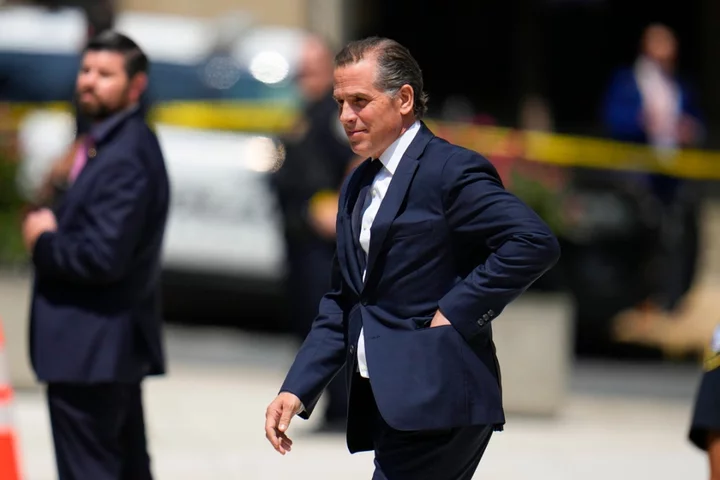
White House says Biden won’t pardon son for tax and firearms charges
The White House on Thursday said President Joe Biden would not use his authority as president to grant any pardons or other relief that would short-circuit the criminal case against his son, Hunter Biden. The younger Mr Biden, an attorney and lobbyist turned visual artist, is currently facing two misdemeanour charges for allegedly failing to pay taxes for two years, as well as a felony charge for allegedly lying on a gun background check form. During Thursday’s daily White House press briefing, press secretary Karine Jean-Pierre was asked if his father, the president, would consider pardoning his only surviving son. Ms Jean-Pierre replied: “No”. Federal prosecutors and attorneys for President Joe Biden’s son, Hunter Biden had previously settled on a deal for the lawyer and lobbyist turned artist to plead guilty to tax misdemeanour charges and enter into a diversion programme on a gun-related charge, but the judge overseeing the case demanded more information from both sides during a hearing at a Wilmington, Delaware courthouse on Wednesday. US District Judge Maryellen Noreika ordered attorneys from both sides to file briefs with the court on a provision of the diversion agreement which she had questioned because it raised separation of powers concerns, or modify the agreement to exclude the provision she questioned. The agreement, which she had reviewed, said that she would be responsible for deciding if Mr Biden was ever in breach of the agreement. She suggested that such a role would be improper for her because it is the executive branch, through prosecutors, which makes charging decision. Because Mr Biden had to enter a plea at his court appearance, he has pleaded not guilty while attorneys from both sides confer to make the agreement comply with the judge’s concerns. He will be able to enter a guilty plea when his attorneys and prosecutors have settled on language for a deal. Read More Trump slaps down reports of imminent Jan 6 grand jury indictment - live Sen Dianne Feinstein appears confused at meeting Deep dive into Meta's algorithms shows that America's political polarization has no easy fix
2023-07-28 03:24
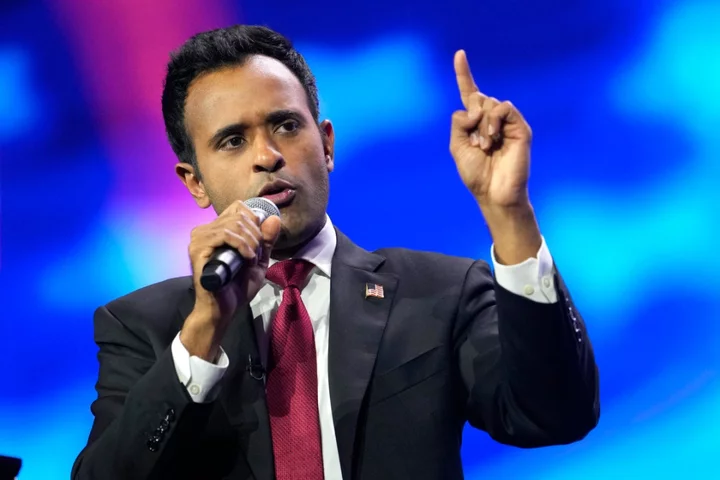
Viewers horrified as Vivek Ramaswamy tries to rap in Fox News interview
Republican 2024 presidential candidate and entrepreneur Vivek Ramaswamy concluded an interview on Fox & Friends by trying to rap. Host Steve Doocy said, “Someone has uncovered that in college … you were a libertarian rapper.” “Some of these opposition research stories are false, but I will confirm that one is true,” Mr Ramaswamy replied with a smile. “I was a little bit of a libertarian freestyler in college and had some fun with it.” “That’s kind of what I’m doing on the campaign trail: freestyling my message,” he added. Then the GOP candidate showed that the rumours were true, breaking into a freestyle on the air: “My name’s Vivek, it rhymes with ‘cake,’” he opened. “It is about thee, the United States is about lib-er-tee, so Fox & Friends join us on the trail, we’ll have some fun, I’ll see you at the trail.” Viewers quickly mocked Mr Ramaswamy’s rap abilities. One user on X, formerly known as Twitter, wrote: “One Watch 2024 Candidate Vivek ‘Da Vek’ Ramaswamy Freestyle Rap on Fox & Friends (He’s Not Great)” Another commented on the video: “*gag*” And yet another wrote: “Aaaaand that just ended his campaign lol” Someone even went so far as to say that Mr Ramaswamy “is just embarrassing at this point.” Read More Ramaswamy slated to headline South Carolina county GOP fundraiser in return to early voting state The presidential candidates who have so far met criteria to join first RNC debate GOP presidential hopeful Vivek Ramaswamy lists Senators Ted Cruz and Mike Lee as possible Supreme Court picks
2023-07-28 01:53

Several injured in stabbing outside Magnolia Bakery in New York’s West Village
A suspect is in custody after several people were injured in a stabbing near The Magnolia Bakery on Bleecker Street in Manhattan’s West Village, according to a report. A 911 call came in reporting an incident at W 11th St & Bleecker St, the Citizen website stated at 9.58am on Thursday morning. First responders arrived at the scene to attend to several stabbing victims with non-life-threatening injuries and officers called a Level 1 Mobilization and request for additional units as the search for the suspect expanded. Officers said that the suspect was a Black man wearing a gold chain and a navy blue shirt who fled the scene in the direction of an E train station, according to the site, which stated at 10.27am that officers reported having detained the suspect. The Independent has reached out to the NYPD for comment. Eli Klein, an art dealer and publisher according to his bio on X, the platform formerly known as Twitter, wrote shortly before 10am on Thursday that “Someone was just attacked in what looked like a stabbing a few feet away from me and my baby girl here in Manhattan’s West Village. NYC really needs to take broader steps to get violent criminals off of the streets”. “Looks like he just went on to stab more people, unless this is a different criminal, which wouldn’t surprise me. My description of the attacker I saw is: Black, male, 30s, 5’10, gray outfit,” he added in reference to the Citizen report. More follows...
2023-07-27 23:28

West Village stabbing - live: Multiple people injured in attack near NYC’s Magnolia Bakery
Multiple people have been injured in a stabbing in New York City’s West Village that took place on Thursday morning, reports say. Initial reports suggest that the incident occurred outside the famous Magnolia Bakery on the corner of W11th Street and Bleecker Street in the heart of the wealthy neighbourhood on the west side of Manhattan. It is not clear how many people have been injured in the stabbing, but their injuries are not believed to be life-threatening. Reports on the Citizen app indicate that police quickly apprehended a suspect shortly after releasing a brief description of him as an African American male in a navy shirt and gold chain. More follows...
2023-07-27 23:20
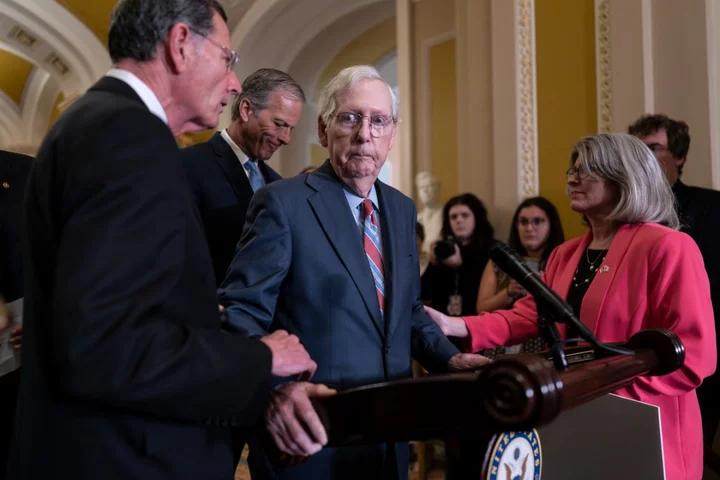
Mitch McConnell’s health history reveals previous issues as he freezes during briefing
Mitch McConnell froze and briefly appeared to be unable to continue speaking during a Senate Republican press conference. He was led away by colleagues and returned not much later, stating that he was “fine”. This is not the first time that the 81-year-old has had a health scare. The scene occurred on Wednesday as Republicans held their last weekly press briefing before the August recess, and discussed remaining business including the chamber’s effort to pass a defence spending bill before the holiday begins. Mr McConnell was seen freezing at the podium for several seconds before a number of senators, including Joni Ernst of Iowa, approached him and encouraged him to step away. He did so, only to come back a few minutes later. He refused to elaborate on what had just occurred. “Can you address what happened here at the start of the press conference? Was it related to your injury from earlier this year when you suffered a concussion?” asked CNN’s Manu Raju. “I’m fine,” responded the senator. “You’re fine? You’re fully able to do your job?” Raju asked in response, to which the minority leader replied: “Yeah.” Mr McConnell entered the Senate in 1985 and has been the top Republican since 2007. Mr McConnell’s freezing at the press conference is likely to be looked at with scrutiny given the renewed interest in the issues presented by the increasingly advanced ages of many of the members of the upper chamber of Congress. Senator Dianne Feinstein of California, in particular, has been the subject of intense criticism on the matter as many have argued that the 90-year-old, who has sometimes appeared confused in interactions with reporters and staff, is no longer up to serving. This is a rundown of Mr McConnell’s previous health issues: Childhood polio He continues to walk with a limp, a residual issue caused by his battle with polio at a young age. When Mr McConnell was two years old in 1944, his upper left leg was paralyzed by polio and he was treated at the Warm Springs Institute in Georgia established by Democratic World War II President Franklin Delano Roosevelt for his own struggle with the same disease. “When I was a child and my dad was in World War II, I got polio. I recovered, but my family almost went broke,” Mr McConnell said in a 1990 re-election ad. “Today, too many families can’t get decent, affordable health care. That’s why I’ve introduced a bill to make sure healthcare is available to all Kentucky families, hold down skyrocketing costs, and provide long-term care.” Since that ad, Mr McConnell has been criticized by his political opponents for working against affordable healthcare. In 2020, as the Covid-19 pandemic was underway, Mr McConnell told the AP that it reminded him of having polio as a child. “Why does this current pandemic remind me of that? I think number one is the fear,” he said. “And the uncertainty you have when there’s no pathway forward on either treatment or a vaccine and that was the situation largely in polio before 1954.” At the time of the AP interview, only 16,000 people in the US had died of Covid-19. As of today, more than 1.1 million have died in the US as a result of the pandemic, according to the WHO. “There’s hope that we’re going to get on top of this disease within a year, year and a half,” Mr McConnell told the AP in 2020. Speaking about his childhood polio, Mr McConnell grew emotional as he said he was “lucky” to have a mother “who was determined to see me walk again”. “Tenacity, hard work and not giving up – my mother instilled all that in me before I was four years old and I think it’s been a guiding principle in how I lead my life,” he added. Asked how his mother could afford his polio treatment, Mr Connell told the AP: “Honestly, I don’t know the answer to that.” He recalled the relief at the arrival of the polio vaccine. “I’ve had a normal life, but I’ve been acutely aware of the disease that I had and the relief that the country had when they found the vaccine,” he said in 2020, months ahead of the Covid-19 vaccine’s arrival. “We’re going to get that relief.” Triple heart bypass surgery Mr McConnell had a triple heart bypass surgery in February 2003 in connection to blocked arteries. The procedure was conducted at the National Naval Medical Center in Bethesda, Maryland, just outside Washington, DC. A fall that caused a concussion The 81-year-old Mr McConnell returned to the Senate in March of this year after suffering a fall that caused a concussion. “Leader McConnell tripped at a dinner event,” communications director David Popp said at the time, adding that Mr McConnell would be in hospital for “a few days of observation and treatment”. The event was at the Waldorf Astoria DC – previously the Trump International Hotel from 2012 to 2022. One of the colleagues at Mr McConnell’s side guiding him away after he froze on Wednesday, Senator John Barrasso of Wyoming, a physician by training, said at the time that he expected that Mr McConnell would make a full recovery. Mr McConnell also fell at his home in Louisville, Kentucky in August 2019, suffering a shoulder fracture. Read More Mitch McConnell leaves press conference abruptly after appearing unable to speak Kevin McCarthy denies he made any deal with Trump to try to expunge his impeachments Kentucky attorney general can’t explain why he hasn’t used key to his office in three years Mitch McConnell recently ‘fell in airport and was using wheelchair’ before blackout Trump wants to see Biden impeached, and other Republicans are quick to pile on Mitch McConnell’s health history reveals previous issues after briefing freeze
2023-07-27 16:46
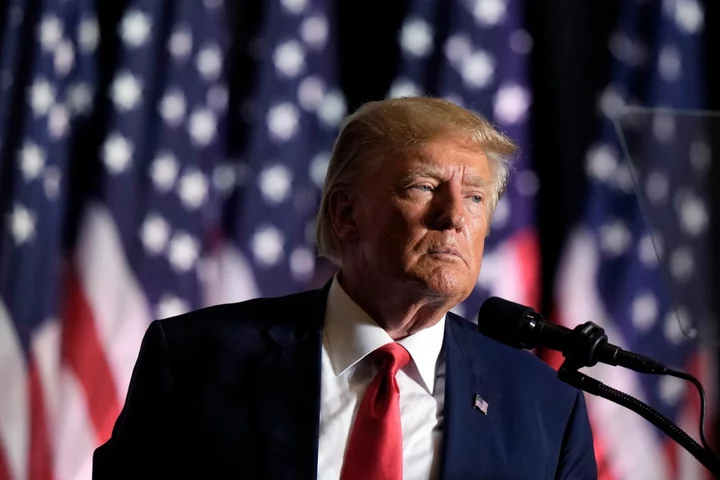
Trump news – live: Melania distances herself from 2024 campaign as Trump team prepares for grand jury vote
Donald Trump is said to be preparing for the federal grand jury to potentially vote to indict him on charges over the January 6 Capitol riot and his efforts to overturn the 2020 presidential election today. Sources told NBC News that the former president’s legal and political teams are getting ready for the possibility that the vote will take place on Thursday – and that Mr Trump will be hit with his third criminal indictment. Last week, Mr Trump said he had received a letter from special counsel Jack Smith’s office saying he is the target of a grand jury investigation. Former New York City Police Department commissioner Bernie Kerik, a Rudy Giuliani ally, has since agreed to turn over hundreds of documents to the DOJ as part of its probe, court documents reveal. Ahead of the potential looming indictment, Mr Trump has gone on the attack against his political rivals and Mr Smith, and also posted a video begging Congress to help save him from his escalating legal troubles. This comes as Melania Trump is reportedly distancing herself from her husband’s 2024 campaign, rejecting multiple requests to join him at campaign stops. Read More What Donald Trump’s trial date means for the 2024 election Trump demands cameras in courtroom for potential election fraud case Trump legal team tries again to block Georgia election interference grand jury probe Is Donald Trump a legal unicorn?
2023-07-27 16:20
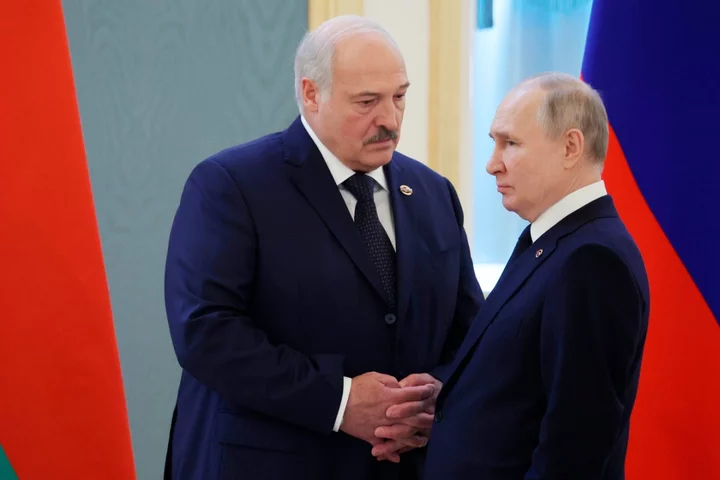
Bluffing or not, Putin’s declared deployment of nuclear weapons to Belarus ramps up saber-rattling
Sometime this summer, if President Vladimir Putin can be believed, Russia moved some of its short-range nuclear weapons into Belarus, closer to Ukraine and onto NATO's doorstep. The declared deployment of the Russian weapons on the territory of its neighbor and loyal ally marks a new stage in the Kremlin’s nuclear saber-rattling over its invasion of Ukraine and another bid to discourage the West from increasing military support to Kyiv. Neither Putin nor his Belarusian counterpart, Alexander Lukashenko, said how many were moved — only that Soviet-era facilities in the country were readied to accommodate them, and that Belarusian pilots and missile crews were trained to use them. The U.S. and NATO haven’t confirmed the move. NATO Secretary-General Jens Stoltenberg denounced Moscow’s rhetoric as “dangerous and reckless,” but said earlier this month the alliance hasn’t seen any change in Russia’s nuclear posture. While some experts doubt the claims by Putin and Lukashenko, others note that Western intelligence might be unable to monitor such movement. Earlier this month, CNN quoted U.S. intelligence officials as saying they had no reason to doubt Putin’s claim about the delivery of the first batch of the weapons to Belarus and noted it could be challenging for the U.S. to track them. Unlike nuclear-tipped intercontinental ballistic missiles that can destroy entire cities, tactical nuclear weapons for use against troops on the battlefield can have a yield as small as about 1 kiloton. The U.S. bomb in Hiroshima in World War II was 15 kilotons. The devices are compact: Used on bombs, missiles and artillery shells, they could be discreetly carried on a truck or plane. Aliaksandr Alesin, an independent Minsk-based military analyst, said the weapons use containers that emit no radiation and could have been flown into Belarus without Western intelligence seeing it. “They easily fit in a regular Il-76 transport plane,” Alesin said. “There are dozens of flights a day, and it’s very difficult to track down that special flight. The Americans could fail to monitor it.” Belarus has 25 underground facilities built during the Cold War for nuclear-tipped intermediate-range missiles that can withstand missile attacks, Alesin said. Only five or six such depots could actually store tactical nuclear weapons, he added, but the military operates at all of them to fool Western intelligence. Early in the war, Putin referenced his nuclear arsenal by vowing repeatedly to use “all means” necessary to protect Russia. He has toned down his statements recently, but a top lieutenant continues to dangle the prospect with terrifying ease. Dmitry Medvedev, the deputy head of Russia’s Security Council who served as a placeholder president in 2008-12 because Putin was term-limited, unleashes near-daily threats that Moscow won’t hesitate to use nuclear weapons. In a recent article, Medvedev said “the apocalypse isn’t just possible but quite likely,” and the only way to avoid it is to bow to Russian demands. The world faces a confrontation "far worse than during the Cuban missile crisis because our enemies have decided to really defeat Russia, the largest nuclear power,” he wrote. Many Western observers dismiss that as bluster. Putin seems to have dialed down his nuclear rhetoric after getting signals to do so from China, said Keir Giles, a Russia expert at Chatham House. “The evident Chinese displeasure did have an effect and may have been accompanied by private messaging to Russia,” Giles told The Associated Press. Moscow’s defense doctrine envisages a nuclear response to an atomic strike or even an attack with conventional weapons that “threaten the very existence of the Russian state.” That vague wording has led some Russian experts to urge the Kremlin to spell out those conditions in more detail and force the West to take the warnings more seriously. “The possibility of using nuclear weapons in the current conflict mustn’t be concealed,” said Dmitry Trenin, who headed the Moscow Carnegie Center for 14 years before joining Moscow’s state-funded Institute for World Economy and International Relations. “The real, not theoretical, perspective of it should create stimuli for stopping the escalation of the war and eventually set the stage for a strategic balance in Europe that would be acceptable to us,” he wrote recently. Western beliefs that Putin is bluffing about using nuclear weapons “is an extremely dangerous delusion,” Trenin said. Sergei Karaganov, a top Russian foreign affairs expert who advises Putin’s Security Council, said Moscow should make its nuclear threats more specific in order to “break the will of the West” and force it to stop supporting Ukraine as it seeks to reclaim Russian-held areas in a grinding counteroffensive. “It’s necessary to restore the fear of nuclear escalation; otherwise mankind is doomed,” he said, suggesting Russia establish a “ladder" of accelerating actions. Deploying nuclear weapons in Belarus was the first step, Karaganov said, with perhaps a follow-up of warning ethnic Russians in countries supporting Ukraine to evacuate areas near facilities that could be nuclear targets. If that doesn’t work, Karaganov suggested a Russian nuclear strike on Poland, alleging Washington wouldn’t dare respond in kind to protect a NATO ally, for fear of igniting a global war. “If we build the right strategy of intimidation and even the use of it, the risk of a retaliatory nuclear or any other strike on our territory could be reduced to a minimum,” he said. “Only if a madman who hates his own country sits in the White House would America risk to launch a strike ‘in the defense’ of the Europeans and draw a response, sacrificing Boston for Poznan.” The Moscow-based Council of Foreign and Defense Policies, a panel of leading military and foreign policy experts that includes Karaganov, denounced his comments as “a direct threat to all of mankind.” While pro-Kremlin analysts floated such scenarios, Lukashenko, the Belarusian leader, says hosting Russian nuclear weapons in his country is meant to deter aggression by Poland. He claimed a number of nuclear weapons were flown to Belarus without Western intelligence noticing, with the rest coming later this year. Officials in Moscow and Minsk said the warheads could be carried by Belarusian Su-25 ground attack jets or fitted to short-range Iskander missiles. Giles, of Chatham House, said the deployment was about “cementing Putin’s control over Belarus” and did not offer Moscow any military advantage over placing them in Russia’s Baltic exclave of Kaliningrad that borders Poland and Lithuania. The West should recognize this as a ploy "that has far more to do with Russia’s ambitions for Belarus than any genuine impact on European security beyond that,” Giles said. Some observers question whether the deployment to Belarus has even happened. Miles Pomper, a senior fellow at the James Martin Center for Nonproliferation Studies at the Middlebury Institute, challenged Lukashenko’s claim that nuclear weapons were covertly flown to Belarus. They are normally moved by rail, he said, and there are no signs of "the support elements that you would see that would go with shipments of weapons.” Others note Russia could have deployed the weapons without adhering to protocols used in the 1990s, when Moscow wanted to show the West its nuclear arsenal was secure amid economic and political turmoil. Belarusian military analyst Valery Karbalevich said keeping such details secret could be a Kremlin strategy of "applying permanent pressure and blackmailing Ukraine and the West. The unknown scares more than certainty.” Alesin, the Minsk-based analyst, argued that U.S. and NATO may play down the deployment of nuclear weapons to Belarus because they pose a threat the West finds difficult to counter. “The Belarusian nuclear balcony will hang over a large part of Europe. But they prefer to pretend that there is no threat, and the Kremlin is just trying to scare the West,” he said. If Putin decides to use nuclear weapons, he may do it from Belarus in hopes that a Western response would target that country instead of Russia, Alesin said. The political opposition to Lukashenko warns that such a deployment turns Belarus into a hostage of the Kremlin. While Lukashenko sees such weapons as a “nuclear umbrella" protecting the country, "they turn Belarus into a target,” said exiled opposition leader Sviatlana Tsikhanouskaya, who tried to unseat the authoritarian leader in a 2020 election widely viewed as fraudulent. “We are telling the world that preventative measures, political pressure and sanctions are needed to resist the deployment of nuclear weapons to Belarus," she said. "Regrettably, we haven’t seen a strong Western reaction yet.” ___ Yuras Karmanau in Tallinn, Estonia, Jill Lawless in London and Ellen Knickmeyer in Washington contributed. ___ The Associated Press receives support for nuclear security coverage from the Carnegie Corporation of New York and Outrider Foundation. The AP is solely responsible for all content. ___ Follow AP's coverage of the war in Ukraine at https://apnews.com/hub/russia-ukraine Read More Ukraine war’s heaviest fight rages in east - follow live Charity boss speaks out over ‘traumatic’ encounter with royal aide Ireland won’t offer condolences to Russia if Putin dies, Varadkar says Ireland unlikely to offer condolences to Russia if Putin dies, Varadkar says Angry Russia refuses to speak at UN meeting on its attacks on Ukraine's key port city of Odesa.
2023-07-27 13:25
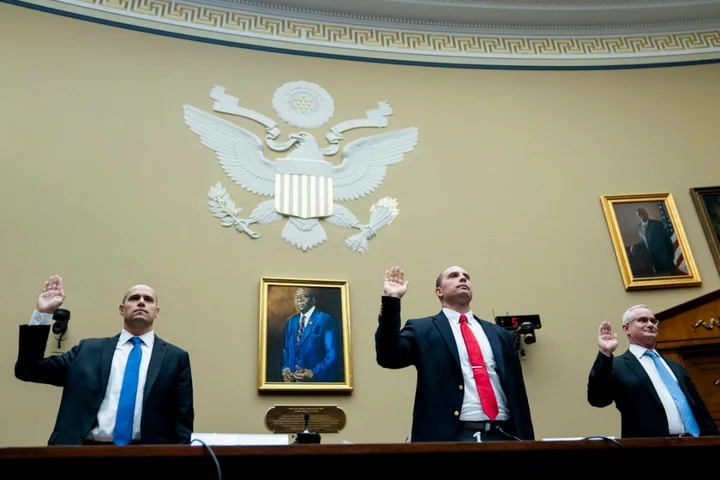
Explosive claims, impossible craft and questions of ‘murder’: House UFO hearing probes alleged alien technology defying laws of physics
Aliens and UFOs were the topic du jour in Washington DC as the House Subcommittee on National Defense met to hear testimony from three men — two Navy pilots and one former intelligence officer — who are warning that the skies may not be as safe as Americans previously thought. While the hearing was not specifically probing whether or not aliens have visited Earth — instead being ostensibly focused on the alleged prevalence of unidentified aerial objects over US skies — the discussion of extraterrestrials and "non-human biologics" no less permeated the discussion. The three men who sat before the subcommittee were David Grusch, a former intelligence officer in the Air Force and National Geospatial Intelligence Agency; former Navy pilot Ryan Graves, who claims to have encountered UAPs during missions; and David Fravor, another Navy pilot, who recorded the infamous "Tic Tac" UAP video in 2004. The witnesses agreed that the US is lacking in a proper reporting system for UAP sightings, with Mr Graves noting that both military and commercial pilots who claim to have encountered the craft feel as though they cannot report the sightings without suffering stigma and potential career retaliation. The witnesses Mr Graves was most concerned with the dearth of reporting options for pilots who encounter the supposed craft. He had his own experience in 2014, when a squadron under his command encountered "dark grey or black cubes ... inside of a clear sphere, where the apex or tips of the cubs were touching the inside of that sphere" approximately 10 miles off the coast of Virginia Beach. He said his pilots described the craft performing impossible aerial maneuvers that he said would kill a human and were far beyond the capability of any known technology. Mr Graves further stated that such encounters were "not rare, or isolated" and that there was no official means of reporting such encounters. "If everyone could see the sensor and video data I witnessed, our national conversation would change," Mr Graves said in his opening statement. "I urge us to put aside stigma and address the security and safety issue this topic represents. If UAP are foreign drones, it is an urgent national security problem. If it is something else, it is an issue for science. In either case, unidentified objects are a concern for flight safety. The American people deserve to know what is happening in our skies. It is long overdue." Mr Fravor offered an account of his 2004 incident off the coast of San Diego, during which he said he encountered a "smooth" white object he likened to a tic tac mint or a propane tank. He said he spotted it hovering over the water before it rapidly ascended, accelerated, and disappeared. He noted that there was white water beneath the craft — suggesting something may have been under the water — and that the white water was gone after it disappeared. "I think what we experienced was, like I said, well beyond the material science and the capabilities that we had at the time, that we have currently or that we're going to have in the next 10 to 20 years," Mr Fravor said. The "Tic Tac video" was featured in a 2017 New York Times article discussing UAPs written by the same individuals who first reported on Mr Grusch's whistleblower claims. Both pilots agreed that the UAPs they encountered represented national security threats to the United States. Mr Grusch, who spent 14 years working as an intelligence officer, offered the most fantastic of the claims during the hearing, but provided the least evidence of any of the witnesses. He said he decided to blow the whistle on the US government after learning from another individual that the US has retrieved wreckage from UAPs and is currently reverse-engineering the technology. “I was informed in the course of my official duties of a multi-decade UAP crash retrieval and reverse engineering program to which I was denied access,” he said. He further claimed that a UAP the size of a football field has been concealed somewhere, and that "non-human biologics" were found piloting some of the crashed UAPs. Mr Grusch has made clear that he was not a personal witness to any of what he claims, but is repeating what he was told by individuals he deems as credible. The Pentagon has denied his claims of a coverup. Sue Gough, a Defense Department spokesperson, said investigators have not found “any verifiable information to substantiate claims that any programs regarding the possession or reverse-engineering of extraterrestrial materials have existed in the past or exist currently.” The statement did not address the recovery of craft not suspected of being extraterrestrial in nature. During the hearing, Congressman Tim Burchett asked Mr Grusch if he was aware of anyone who had been harmed in the interest of the US government maintaining secrecy about the alleged crashed UAPs. "Do you have any personal knowledge of people who have been harmed or injured in efforts to cover-up or conceal these extra-terrestrial technologies," he asked. “Yes. Personally,” he replied. Mr Burchett then asked, "has anyone been murdered?" Mr Grusch hesitated for a moment. "I have to be careful asking [sic] that question," he said, citing a current investigation into whether or not he was the subject of retaliatory action for whistleblowing. "I directed people with that knowledge to the appropriate authorities." He further went on to claim that he was aware of planned retaliation efforts against him by his former superiors in the US government, and that he was aware of unsanctioned "IRAD" programs in which government contractors were overcharging American government buyers and using the excess profit to funnel into DOD research programs. Lines for the hearing stretched far down the hall, with UFO enthusiasts mixing alongisde the media in hopes of witnessing "disclosure" — the long-awaited acknowledgment by the US government that we are not alone in the universe. However, they were left with only a tease of information; each time Mr Grusch was asked to provide specific information — details about the IRAD programs, the locations of supposed crashed UAPs, specifics about the "non-human" entities allegedly found with the wreckage — he assured the Congressional leaders that he knew the answers, but could not provide them publicly. He said he could provide specific information only in a closed session or in a secure environment, citing confidentiality concerns. Congressional questions The bipartisan subcommittee expressed appreciation for the witnesses' testimonies and broadly operated from the position that the government was withholding information concerning the true nature of UAPs — whether they are controlled by foreign adversaries, aliens, or something else entirely — and several members assured the witnesses they would be protected for possible retaliation. While Mr Graves and Mr Fravor said they did not experience blowback for their reports, Mr Grusch claimed he had, prompting Congressman Jamie Raskin to ask for details about his experiences. He said he was aware of "active planned reprisal" coming from "leadership at my previous organisation," and said he referred to the retaliation as "administrative terrorism." Congresswoman Alexandria Ocasio-Cortez centred her questioning on Mr Grusch's claims concerning independent research and development — IRAD — programs funneling money from American government buyers into "unsanctioned" DOD programs. Earlier in his testimony, Mr Grusch told Congressman Jared Moskowitz he was aware of IRADs funding "unsanctioned" development of "advanced technology." Ms Ocasio-Cortez said she had seen IRAD programs and regulations requiring agencies initiating research to notify oversight bodies abused, and asked "if you were me, where would you look" to find evidence for the claims that government contract money was being siphoned to unrelated research and development. Mr Grush said he would be happy to provide the details "in a closed environment" and said he could tell her "specifically." Congresswoman Nancy Mace zeroed in on what many of the attendees were likely hoping to hear addressed; the existence of aliens. “Do you believe our government has made contact with intelligence extraterrestrials,” she asked. Mr Grusch said it was “something I can’t discuss in a public setting,” resulting in a curious eyebrow raise from longtime UFO researcher, reporter, and occasional Coast to Coast AM guest host George Knapp, who was seated behind Mr Grusch. Ms Mace continued, asking “if you believe we have crashed craft ... do we have the bodies of the pilots who piloted [these] craft?” “As I’ve stated publicly already in my NewsNation interview, biologics came with some of these recoveries, yeah.” She then asked if they were “human or non-human biologics?” “Non-human, and that was the assessment of people with direct knowledge on the program I talked to, [who] are still on the program,” he said. Ms Mace then asked if any evidence — photo, video, eyewitnesses — of such creatures existed. “The specific documentation I would have to talk to you in a SCIF about,” he replied. Congressman Glenn Grothman, who chaired the subcommittee, said he anticipated legislation would come out of continued, closed-door discussions with the witnesses. "Several of us are going to look forward to getting some answers in a more confidential setting," he said. "I assume some legislation will come out of this." Read More Congressman asks UFO whistleblower if anyone has been ‘murdered’ to maintain alleged coverup Tom DeLonge left Blink-182 for an alien adventure. Now back on tour, his UFO mission is taking off in Congress Republican lawmaker claims US is ‘hiding evidence’ of UFOs which ‘defy physics as we know it’ Watch: Congress holds hearing on UFOs What to expect from the House committee hearing looking into UFOs Biden looks to provide relief from extreme heat as record temperatures persist
2023-07-27 12:59
